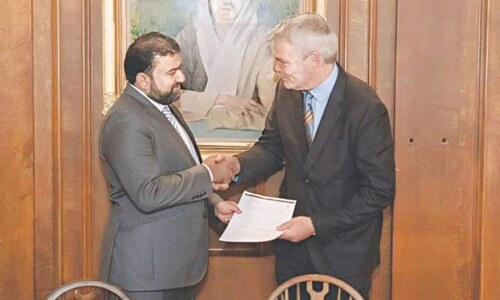RAWALPINDI, July 20: National Institute of Health (NIH) has given a clean chit to Rawalpindi city, as it found the presence of polio virus in the city sewage as negligible, for the month of June.The month of May had however painted a different scenario.
Talking to Dawn, Director Health Dr Zafar Iqbal Gondal said for the month of May, the World Health Organisation (WHO) and the health department conducted joint sampling and found polio virus in Safdarabad.
Later, the Water and Sanitation Agency (Wasa) also managed to get sewage and water samples tested from National University of Science and Technology (Nust), which also did not find the polio virus.
Due to varied results, he said, the commissioner sent the samples to NIH in the presence of WHO officials which declared the samples polio virus free.
He passed the buck on Islamabad’s slum areas as the capital’s sewer discharged into Leh Nullah and polio virus traveled from Islamabad to Rawalpindi.
“We already brought the matter to WHO’s attention that I-II katchi abadi and Sabzi Mandi (fruit and vegetable market) in Islamabad was the source spreading polio virus in the garrison city, due to frequent movement of people migrating from Khyber Pakhtunkhawa,” he said.
He said the slum dwellers in I-11 and adjoining areas of capital city would be put on priority of Islamabad’s administration.
He also said the health department had sent a proposal to District Coordination Officer (DCO) Saqib Zafar to write a letter to Islamabad administration to intensify their anti-polio campaign in slum areas to achieve 100 per cent results.
Dr Gondal said the health department focused on 10 union councils due to the presence of a large number of people coming from Khyber Pakhtunkhwa.
The union councils 1 to 10 are Ratta Amral, Dhoke Ratta, Hazara Colony, Dhoke Mangtal, Dhoke Hassu South, Dhoke Hassu, Pirwadhai, Fauji Colony, Bangash Colony and Khyaban-i-Sir Syed in the city and Ward No 9-10 in cantonment areas including Peshawar Road, Misrial Road, Dhoke Mastaqeem, Dhoke Hafiz, Allahabad, Westridge, Naseerabad and adjoining areas.
He said that the campaign in these areas would be launched to provide additional dose of polio vaccination to children to eliminate any chances of the virus spreading.
He said cases involving refusal to take the dose were also declining in the district as the DCO had provided the list to the assistant commissioners, who sent teams to their houses and provided anti-polio drops to their children.
In Rawalpindi, one case was detected in 2009 and one case of polio in 2010. In 2011, no cases of polio were detected.
The presence of polio virus in Pirwadhai and adjoining areas had forced the health department to launch the present campaign.








































Dear visitor, the comments section is undergoing an overhaul and will return soon.